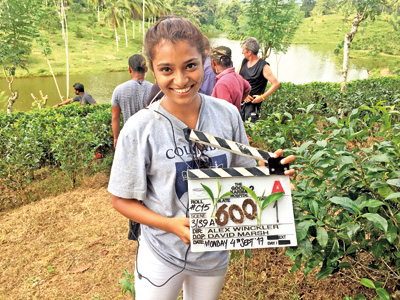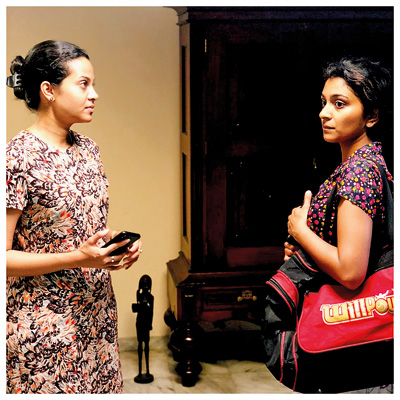Arts
A rising star
On a rainy day in 2017, Dinara Punchihewa was working on the production team of ITV’s hit medical drama ‘The Good Karma Hospital’ holding an umbrella for the actors on set. Last year, audiences at home and abroad watched her embrace her first lead role in visionary filmmaker PrasannaVithanage’s much anticipated film ‘Gaadi’ (Children of the Sun).

Life-changing film: Dinara as Tikiri (here and on our Magazine cover) and Sajitha Anuththara as Vijaya in a still from Gaadi. Pic by Sanjaya Mendis
‘Gaadi’ debuted at Asia’s renowned Busan International Film Festival (BIFF) in South Korea last October. The cinematically masterful, intricately produced period drama is already buzzing with critics’ praise around the globe and was chosen as one of 100 ‘not to be missed films’ from Asia in 2019 by the Asian Film Festival (AFF).
It’s a midweek holiday when we meet, but off-days don’t stop the vivacious young artist who despite a cough and a busy schedule still greets us with a winning smile. The last year has been a whirlwind for the 25-year-old, with two lead film roles on the local and Indian screen, Sinhala and English theatre credits, a critically acclaimed short film and a nonprofit performing arts platform for underprivileged children under her belt.
A product of Ladies’ College Colombo, Dinara’s dream of pursuing a career in acting was cemented watching Rani Mukerji and Shah Rukh Khan sing to each other in a field in Kuch Kuch Hota Hai. Like many parents of the young and beguiled, hers too hoped that she would invariably grow out of her childhood ambition but Dinara only continued to thrive as a young performer. “It’s funny because nobody else in my family is into film or theatre,” she says, letting us in on the ongoing family joke about where she gets her talent from. Nevertheless, her parents supported and nurtured her passion. “I was doing theatre while sitting for my O/L’s” bagging several awards for her acting.
It was around this time that her parents convinced of her ambition supported her pursuit of the arts as she followed her dreams to London to read for a Bachelor of Arts (Honours) in Theatre and Drama at Queen Mary University. Here Dinara was exposed to different and extreme types of theatre; a vast contrast to the conventional stage productions she was used to. The then 18-year- old recalls the first four days of university life. “I wanted to quit and come back.” Being one of two South Asian faces in her class in new and unchartered theatrical territory wasn’t without its share of hiccups; but it left her liberated.

Drama in the hills: On the set with the production team of The Good Karma Hospital. Pic courtesy The Good Karma Hospital
Following her graduation in 2016, the eager young thespian came back home. But finding a space to experiment with vast and unfamiliar aspects of theatre and acting didn’t come easily as it did in England. “I didn’t have the confidence to do much about it once I came back.”
“My life has been like a chain,” she says of her acting opportunities, the result of a series of fortunate events which the enthusiastic Dinara took the chance to learn from. In 2012 it was on the set of Anurag Kashyap’s gangster drama “Bombay Velvet”. Through word of mouth, Dinara joined the local production team for Sri Lanka, casting foreign extras for the period drama. Being on the other side of the audition room gave her valuable insights she still carries with her when she faces any audition. The first seven seconds she reveals, is all the time a casting director needs to gauge an actor, beginning with their first “good morning”. It’s these little tidbits she divulges to us that have had a huge impact on her journey so far.
Her next stint on a set was once again not in an acting capacity. On the set of The Good Karma Hospital, Dinara’s days were spent holding an umbrella for the actors. “At times I’d wonder what I was doing with my life, after studying so hard.” Self-doubt and raised eyebrows at her life choices were often frustrating even for the upbeat Dinara to reconcile with at times. “But it’s the little things that make the difference,” she says, switching back to her gregarious self, her experience in the different areas of production work shaping her into the 360º artist that she set out to be.
The experience has also grounded her and prodded her enough to explore different avenues from commercial acting and modelling to news reading and voice acting. In 2018, she experimented with a story she had written about Sri Lankan domestic workers, based on her own life experience. Having never thought that she would use whatever she picked up from script writing classes at university, she found herself behind the director’s seat for the very first time with a crew of 12 shooting her directorial and acting debut “Maala” over the course of three days. When she screened it for her parents “they couldn’t understand why this 15 minute short film took three days to film” she laughs. But they remained enthusiastic and supportive. A few months later the film was selected as a semi-finalist at the Los Angeles CineFest, Bengal’s International Short Film Festival, screened at the Lobo International Film Festival in Brazil and the Rome Independent Prisma Film Awards.

Eternal, invisible boundaries: Ashini Fernando and Dinara (left) in Maala
Maala was also the first time director PrasannaVithanage got a glimpse of Dinara’s work. On a friend’s suggestion, she went for the open audition for Vithanage’s newest film. Limited experience and her audition number–356; the final number did little to deter her energy. “I just wanted a part,” and by pure luck managed to get pushed forward at the audition when another hopeful didn’t turn up. The scene inside was relaxed as she answered a few questions. When she got a call back she found herself seated in the editing room with the visionary filmmaker who already felt like a friend.
After being given the script to read, Dinara was left alone with the text and her nerves for an hour. “Why am I reading this? Why am I here? I just thought I had got a small role” she mused and was overwhelmed when he asked her for her thoughts on the screenplay and whether she would like to play the titular role of Tikiri.
Almost 25 years in the making, ‘Gaadi’ (Children of the Sun) is a period drama that dives into 18th century Sri Lanka beyond textbook history. Against the background of 1814 Kandy, the film revolves around the rebellion of the Sinhalese nobility against their South Indian ruler, the advent of British rule and the parallel journey of Tikiri; a young noblewoman, now an outcast and her own struggle for identity. Vithanage is no stranger to commercially artistic films with contemporary masterpieces such as Machan (2008) and Akasa Kusum (2008) among others under his belt.
It took eight months of workshops, reading and studying the material Vithanage shared with her to get into the skin of Tikiri. Vithanage’s own easygoing and friendly demeanour eased the challenges of a three month jungle shoot, with natural light in addition to having to learn the Sabaragamuwa dance style; all alien territory for the new actress.
Seeing the film for the first time with her family was emotional at the least. “My mother was lost for words” she says –she had to pester her parents for feedback.
But a similar reaction to Gaadi resounded worldwide since its international premiere at the Busan International Film Festival last year. Most recently it was screened at film festivals in Dhaka winning the Special Jury Mention, Mumbai, Pune and soon the International Film Festival Rotterdam (IFFR). Recognition has followed too. On the streets of Kerala she was stopped by a gentleman who had seen Gaadi the night before.
To say that Gaadi changed her life is an understatement. Dinara wraps up her first Hindi film opposite Indian actorAnkit Vyas with cinematography by Anirban Chatterjee, the result of Director Shubhaleka seeing Gaadi.
Working with directors such as Prasanna Vithanage has also instilled in her a desire for authentic storytelling. Her privileged journey to the silver screen has been a series of God’s plan, the kindness and help of those around her and a very thick skin. “We only see the glamorous side of filmmaking.” But the anticipated phone calls are most often misdialled numbers, the breaks between work long enough for self-doubt and the outsider judgment to creep in and countless emails are sent out with crossed fingers. “Nobody sees the other side of it” and Dinara is unashamedly that person who follows up with the doggedness that only an artist would understand.
This is why she is also dedicated to repaying the kindness that brought her to where she is today. When she’s not working, she’s teaching and conducting performing arts workshops for young, underprivileged children through a nonprofit “Punchi Actors” together with a few likeminded volunteers. “Everyone deserves to have their dreams come true” but her version of the fairytale is only possible with a little help from anyone who cares enough.

